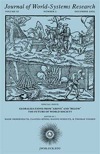Chaos or ReOrder? The Future of Hegemony in a World-System in Upheaval
01/12/05 16:48 Filed in: publicatons
Journal of World-Systems
Research. 2005. 11(2): 209-38
Observing the latest trends of a rise in interest in the development of power distribution in a world-system created and dominated by states but increasingly challenged as such, this paper takes a deeper look at the historical evolution of this system, its current transformation, and likely future development. After a brief discussion of prevalent concepts of world(-)system development and its sociopolitical control, this work offers an evolutionary perspective to place current changes of power and its distribution in the dynamic long-term development of global system formation. It then presents alternative visions of the future development of political and economic hegemony. It concludes that a further rise in instability of global political power distribution accompanied by a likely challenge to existing distributional patterns has a high probability of occurrence.
Observing the latest trends of a rise in interest in the development of power distribution in a world-system created and dominated by states but increasingly challenged as such, this paper takes a deeper look at the historical evolution of this system, its current transformation, and likely future development. After a brief discussion of prevalent concepts of world(-)system development and its sociopolitical control, this work offers an evolutionary perspective to place current changes of power and its distribution in the dynamic long-term development of global system formation. It then presents alternative visions of the future development of political and economic hegemony. It concludes that a further rise in instability of global political power distribution accompanied by a likely challenge to existing distributional patterns has a high probability of occurrence.
BibTeX
Podcasting
18/06/05 16:40 Filed in: publicatons
In:
Handbuch E-Learning.
Expertenwissen aus Wissenschaft und Praxis.
Strategien - Instrumente -
Fallstudien, edited by Hohenstein,
Andreas und Karl Wilbera. Köln: Fachverlag
Deutscher Wirtschaftsdienst. 2002ff. (wird
laufend ergänzt).
Podcasting ist spätestens seit diesem Jahr ein Massenmedium geworden und hat sich als Radio-on-Demand im Internet durchgesetzt. Der folgende Beitrag zeigt jedoch, dass dieses Medium nicht nur in dem relativ beschränktem Umfang als Online-Audio-Datei zum herunterladen verstanden werden sollte, sondern vielmehr als wirkungsvolles kostengünstiges plattform-übergreifendes Medium gerade im E-Learning-Bereich. Bestehende PC-Technologien machen semi-professionelle Ergebnisse in der Produktions-stufe auch mit geringstem Budget und Personal möglich.
Podcasting ist spätestens seit diesem Jahr ein Massenmedium geworden und hat sich als Radio-on-Demand im Internet durchgesetzt. Der folgende Beitrag zeigt jedoch, dass dieses Medium nicht nur in dem relativ beschränktem Umfang als Online-Audio-Datei zum herunterladen verstanden werden sollte, sondern vielmehr als wirkungsvolles kostengünstiges plattform-übergreifendes Medium gerade im E-Learning-Bereich. Bestehende PC-Technologien machen semi-professionelle Ergebnisse in der Produktions-stufe auch mit geringstem Budget und Personal möglich.
BibTeX
The Future of Hegemony and Global System Leadership (2005)
18/06/05 16:30 Filed in: publicatons
In:
The Future of World
Society, edited by Mark Herkenrath,
Claudia König, Hanno Scholtz, and Thomas Volken
(2005) Zurich, CH: Intelligent.
[order here]
The latest resurgence of interest in the concept of hegemony and empire – both in the popular and academic realm – has been mostly the result of a change in perception of power, specifically its sources, application, and distribution. Here we argue, that this can largely be explained as the result of the dynamic changes inherent in the process of global system formation. After a brief discussion of prevalent concepts of political and economic hegemony, this work offers an evolutionary perspective to place current changes of power and its distribution in the dynamic long-term development of global system formation. It then presents alternative visions of the future development of political and economic hegemony. It concludes that a further rise in instability of global political power distribution accompanied by a likely challenge to existing distributional patterns has a high probability of occurrence.
[order here]
The latest resurgence of interest in the concept of hegemony and empire – both in the popular and academic realm – has been mostly the result of a change in perception of power, specifically its sources, application, and distribution. Here we argue, that this can largely be explained as the result of the dynamic changes inherent in the process of global system formation. After a brief discussion of prevalent concepts of political and economic hegemony, this work offers an evolutionary perspective to place current changes of power and its distribution in the dynamic long-term development of global system formation. It then presents alternative visions of the future development of political and economic hegemony. It concludes that a further rise in instability of global political power distribution accompanied by a likely challenge to existing distributional patterns has a high probability of occurrence.
BibTeX
Three Steps in the Globalization of the International System: Global Networks from 1000 B.C.E. to 2053 C.E. (2005)
18/06/05 16:25 Filed in: publicatons
In
Globalization and Global
History, edited by
Barry K. Gills and William R. Thompson (2005)
London: Routledge.
Most treatments of
globalization view it as a relatively recent and
unique process. Combining frameworks of political
geography (world city and network analysis) with a
long-term oriented IR framework, further evidence
is provided for the emergence of an informational
network economy, global in extent, cyclical in
occurrence, and evolutionary in nature. The chapter
empirically traces the origins of today's global
digital infrastructure (in the form of ICT
networks) from the emergence of a commercial
Phoenician system emerging 1000B C.E. over the
13/14th century Italian city-state and 16th century
Dutch maritime commercial networks. The focus on
networks and the re-emergence of global cities as
central nodes in the world economy highlights the
need to add data beyond the state as the level of
analysis for studies of the international system.
At the same time, however, it makes evident the
need to view these nodes as an embedded part of a
state-based international system.


